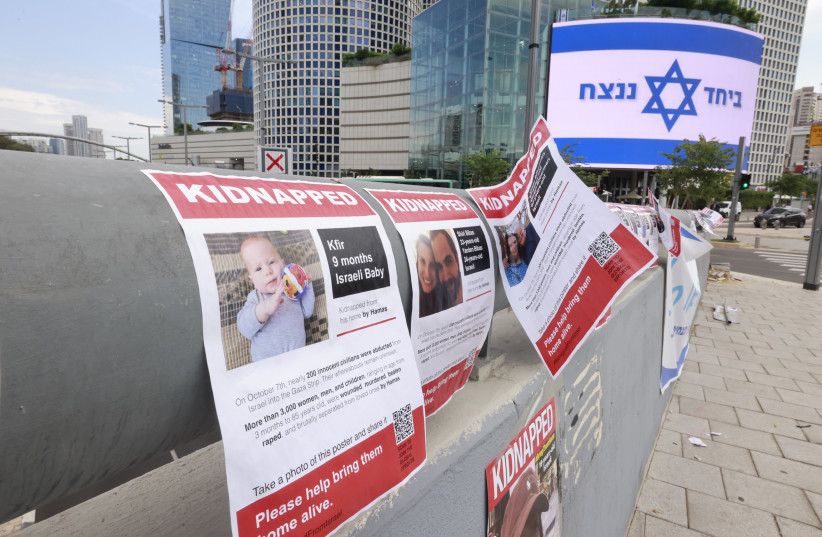Last week’s march from Tel Aviv to Jerusalem by the families of the nearly 240 hostages held by Hamas in Gaza was a show of defiance.
Joined by thousands of supporters, the marchers arrived at the Knesset on Shabbat afternoon in an effort to keep the plight of their loved ones in the public eye and pressure the government to make their release a priority as Israel battles Hamas deep inside Gaza.
There is no time to wait
For some of the families, there is an added urgency.
“People think that there is time, but for babies and for elderly people with difficult, complex needs, there’s no time, time is running out rapidly,” said London-based artist Sharone Lifschitz, whose 83-year-old father was abducted.
The other goal of the marchers was to force the war cabinet – led by Prime Minister Benjamin Netanyahu, along with Minister Benny Gantz and Defense Minister Yoav Gallant – to meet with the families, to hear their appeals and, in return, to tell them what the government is doing to secure their loved ones’ release.
According to the suffering families, they have been mostly kept in the dark and have not been given briefings by government representatives. Likewise, the country’s leaders have not been forthcoming in reaching out to them or meeting them.
“It’s impossible that there are 240 kidnapped people and the government – our government – isn’t talking to [the relatives], isn’t telling them what’s going on, what’s on the table, what’s on offer, what are the reasons for and against. Nothing,” said marcher Stevie Kerem.

The impact of the march
The weeklong march seems to have changed the equation. Gantz said he met with families of the hostages on Saturday after they returned to Tel Aviv for a rally at the city’s Hostage Square. Netanyahu is reportedly set to meet with the families this week, as well.
“Everything we are doing is aimed first and foremost at bringing our boys and girls home,” said Gantz later at a Saturday night press briefing with Netanyahu and Gallant. “I want to bring back the elderly and the children. Nobody here wants anything else.”
The meeting and the declarations come against the backdrop of an impending deal being brokered by Qatar to release some 50 hostages – women and children – in exchange for Palestinian security prisoners being held by Israel and a humanitarian pause of five days in the IDF’s campaign in Gaza.
“The challenges facing the agreement are just practical and logistical,” Qatari Prime Minister Sheikh Mohammed Bin Abdulrahman al-Thani said at a joint press conference with European Union foreign policy chief Josep Borrell in Doha.
“The deal is going through ups and downs from time to time throughout the last few weeks,” al-Thani said. ”But I think that, you know, I’m now more confident that we are close enough to reach a deal that can bring the people safely back to their home.”
Saving the hostages must be Israel's priority
Despite the unbearable stench of dealing with Hamas and enabling its murderous regime to attain some of its goals, Israel’s mission to return whatever hostages it can, whenever it can, should be paramount.
Israel should not reject any deal out of hand, because not enough hostages are being released. Saving 50 of them – especially children – is the most immediate and urgent undertaking, even if it delays the ultimate goal of eradicating Hamas by a few days.
After six weeks in captivity, with their families back home undergoing horrific mental suffering, it is time to do whatever is possible to recover whomever we can – now.
Netanyahu seems to realize this, as evidenced by the war cabinet’s decision to permit two fuel tankers into Gaza. Although he cited the need for a “continued guarantee of international support,” the move could also pave the way for the Qatari deal.
Israel has proven during the first six weeks of the war that it is intent on ending Hamas’s tyrannical rule over Gaza and its threat to the Israeli people. While that should continue to be the overriding objective, it needs to go hand in hand with the sacred charge of obtaining the release of any hostage being held in Gaza whenever the opportunity arises.
